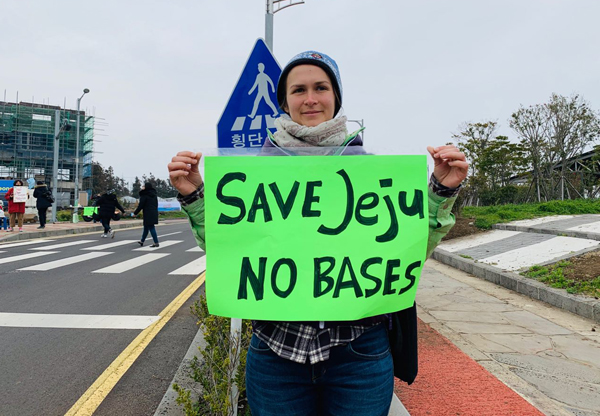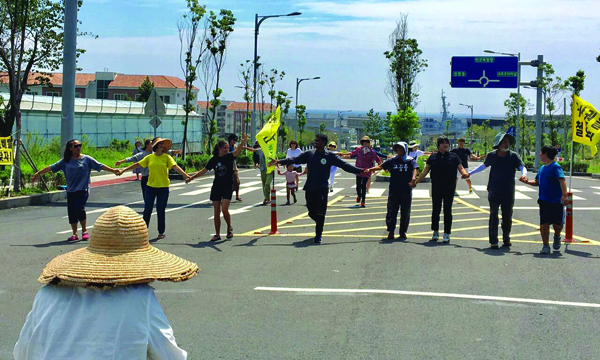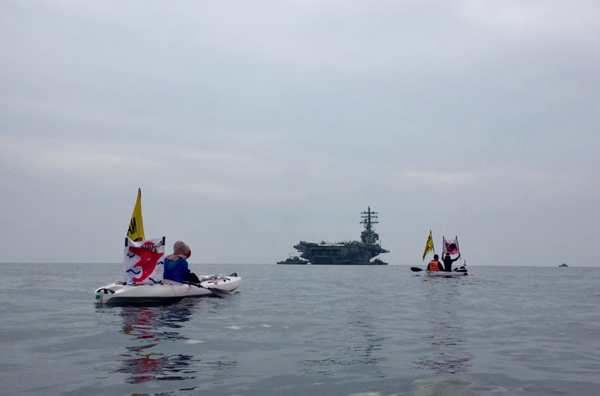카이아 베라이드:
군사기지와 국경을 넘어 펼치는 활동<2>

Kaia: The Jeju Naval Base is like other Korean bases: U.S. ships can visit there anytime. In 2017, the U.S. sent seven warships, and in 2018, there was a fleet review where countries sent their warships and used the opportunity to sell their products. Jeju is faced with a huge trash problem, not just from the tourists but now also from the naval ships. I work to oppose the visits by foreign warships to the naval base.
We share the opposition of the locals with the government, but they ignore us. Similarly, Okinawa is discriminated against by mainland Japan. Anti-base activists there have been struggling for 70 years. The Korean government also likes to cover up the news, trying to make people think that there is no more opposition to the navy base, that all issues are finished.
GN: How should the Jeju local government deal with the influx of refugees from Yemen? Do you support Korea’s cancelation of its visa-free policy?
Kaia: I was involved with Hope School, which organized programs with Yemeni refugees. We shared personal experiences such as cultural exchange between Koreans and Yemenis. We shared our understanding on work expectations. So far, the Korean government has handed refugee status to only one or two people while others have been granted humanitarian visas. The visa-free policy is supposed to bring more tourists, but the reception of refugees is a bigger issue. The Korean government needs to expand its infrastructure, understanding, and overall awareness about refugees.
GN: How do you rate the current efforts of the Korean government in providing humanitarian assistance, employment, or granting refugee status to the Yemeni refugees?
Kaia: The sudden arrival of hundreds of Yemeni refugees in Jeju exposed the lack of preparedness of Korea to live up to its ratification of the U.N. Refugee Convention. This seems to include both a lack of resources dedicated to processing refugee or humanitarian status applications and a relative lack of understanding about refugees and Islam. This was made clear by the reaction of many Koreans against the Yemenis who arrived in Jeju last year.
GN: What are your daily activities in Jeju?
Kaia: From Monday to Saturday, I join the 100 Bows for Life and Peace at 7 a.m. outside the naval base. It is a good way to start the day with some exercise, prayer, meditation, and talk with the friends who join. It creates a space and a presence for peace that weakens the power of militarism in subtle symbolic ways. Although I am not Catholic, I sometimes join the Street Mass that is held at 11 am in a tent across the street from the old construction entrance to the base.
At 12 noon, we form a human chain. In the human chain, everyone is welcome to share songs, poems, and short speeches, and then we dance in the street in front of the base. The experience is a good way for visitors to practice stepping out of their comfort zones, and it is a good exercise and community-building activity for us regulars. After the human chain, everyone joins a community meal at Halmangmul (할망물, also called Samgeori 삼거리) Community Kitchen. Like the sharing of rice in the Gwangju Uprising, this meal is the heart of the peace movement in Gangjeong. People from all over Korea donate food, and “Uncle Jonghwan” has been cooking community meals since the beginning of the struggle against the naval base. This is an important space to meet, share ideas, and support one another.
These are the constant parts of my schedule. Other time is spent writing, editing or translating articles, sharing about Gangjeong on social media, attending meetings, gardening, giving tours to visitors, organizing or attending educational and solidarity events, cooking, drinking coffee, reading, hiking, etc. And now and then, we also have kayak protests.
GN: Any message to our readers?
Kaia: I didn’t mention yet about the new plans for a second airport in Jeju. It is like the Jeju naval base issue all over again. The local people who are most affected are opposed, the environmental destruction is being ignored by the government, and it will even be used by the military as well. Jeju is supposed to be the “Island of World Peace,” but it will take a huge effort to stop the militarization and over-development of Jeju, and save the pristine environment for future generations.
I may have a pretty different set of experiences compared to what is “normal,” but my path has been small gradual steps following and joining along with people who have modeled dedication to peace, justice, love, and community. Maybe I’ll see you on the journey. Don’t forget to check out savejejunow.org and “No Naval Base on Jeju” on Facebook.
Written by Gianna Francesca Catolico and Karina Prananto
The Author
Gianna Francesca Catolico is an intern at the May 18 Memorial Foundation from the Philippines. She recently finished her Masters in Human Rights and Democratization from Mahidol University in Thailand. She has been sojourning around Asia over the past three years.
*This article was originally published in Gwangju News April 2019 issue.
Gwangju News is the first public English monthly magazine in Korea, first published in 2001 by Gwangju International Center. Each monthly issue covers local and regional issues, with a focus on the stories and activities of the international residents and communities. Read our magazine online at: www.gwangjunewsgic.com

-<원문 해석>-
광주뉴스: 제주에 주둔하고 있는 미군 기지를 반대 투쟁하기 위해 당신의 단체에서는 어떤 프로그램이나 캠페인을 하고 있나요? 이런 상황은 오키나와 기지의 상황과 비슷한가요?
카이아: 제주 해군기지는 한국 내 다른 기지와 비슷한 것 같습니다. 미국 선박은 언제든지 해군기지를 방문할 수 있습니다. 2017년 미국은 7척의 군함을 보냈고, 2018년에는 각국이 군함을 보내서 국제관함식을 열고 각국의 제품을 판매할 수 있는 기회로 활용하였습니다. 제주는 관광객들뿐만 아니라 현재 해군 선박으로부터도 엄청난 양의 쓰레기 문제에 직면해 있습니다. 저는 외국 군함이 해군기지를 방문하는 것에 반대하는 일을 하고 있습니다. 우리는 정부에게 지역 주민 반대를 알리려 하지만, 그들은 우리를 무시합니다. 마찬가지로 오키나와도 일본 본토와 다르게 차별을 받고 있습니다. 그곳의 반기지 운동가들은 70년 동안 고군분투해왔습니다. 한국 정부도 주민들이 해군 기지에 대해 더 이상 반대하지 않고 모든 문제가 끝났다고 생각하게 만들면서 뉴스를 은폐하기를 좋아합니다.
광주뉴스: 예멘 난민 유입에 대해 제주지방정부는 어떻게 대처해야 할까요? 한국의 무비자 정책 취소를 지지하시나요?
카이아: 저는 예멘 난민들과 프로그램을 조직한 희망 학교(Hope School)에 참여한 바 있습니다. 저희들은 한국인과 예멘인의 문화교류 등 개인적인 경험을 공유했고, 예상되는 일에 대한 이해를 공유했습니다. 현재까지 한국 정부는 한두 명에게만 난민 지위를 준 반면, 다른 사람들에게는 인도주의적 비자를 주었습니다. 무비자 정책으로 더 많은 관광객을 유치하였지만 난민 수용은 더 큰 문제가 되었습니다. 한국 정부는 난민에 대한 인프라와 이해, 전반적인 인식을 확대할 필요가 있습니다.
광주뉴스: 예멘 난민들에게 인도주의적 지원이나 고용, 난민 지위 부여에 대한 한국 정부의 현재 노력을 어떻게 평가하나요?
카이아: 제주에 수백명의 예멘 난민이 갑자기 입국함으로 인해 유엔 난민 협약 비준까지 한국의 준비 부족이 있었음을 보여줬습니다. 여기에는 난민 처리 전담 자원 부족이나 인도주의적 지위 신청 및 난민과 이슬람에 대한 상대적 이해 부족이 모두 포함된 것으로 보입니다. 이는 지난해 제주에 도착한 예멘인들에 반대하는 많은 한국인의 반응으로 명백해졌습니다.
광주뉴스: 제주에서 매일 하는 일은 무엇인가요?
카이아: 월요일부터 토요일까지, 저는 해군 기지 밖에서 아침 7시에 있는 생명과 평화를 위한 100배 운동(100 Bows for Life and Peace)에 참가하고 있습니다. 운동, 기도, 명상, 함께 하는 친구들과 이야기를 나누는 것은 하루를 시작하는 좋은 방법입니다. 그것은 미묘한 상징적 방법으로, 군사화의 힘을 약화시키는 평화를 위한 공간과 평화라는 존재를 만들어냅니다. 저는 천주교 신자는 아니지만 가끔 오전 11시에 옛 공사장 입구에서 해군 기지까지의 거리에 있는 텐트에서 열리는 거리 미사에 참가합니다. 12시 정각에 우리는 인간 띠 잇기 행사를 합니다. 인간 띠 잇기 행사에서는 누구나 노래, 시, 짧은 연설을 나누는 것을 환영하고, 그 다음으로 해군기지 앞 거리에서 춤을 춥니다. 이 경험은 방문객들이 자신들의 편안한 영역에서 나와 발을 내딛는 연습을 할 수 있는 좋은 방법이며, 우리 정규 활동가들에게도 좋은 운동이자 공동체 형성 활동입니다. 인간 띠 잇기 행사가 끝나면 모두 할망물(삼거리) 공동체 부엌에서 함께 식사를 합니다. 광주 5.18 민주화 운동 때 쌀밥 나눔처럼, 이 식사는 강정 평화운동의 중심입니다. 한국 전역에서 음식을 기부하고 있으며, '종환 삼촌'은 해군기지 반대 투쟁 초기부터 공동체 식사를 요리하고 있습니다. 이곳은 만나고, 아이디어를 공유하고, 서로 지지할 수 있는 중요한 공간입니다.
이것이 제 일정에서 항상 하는 부분입니다. 남은 시간에는 글쓰기를 하거나, 기사를 편집하고 번역하거나, SNS에서 강정에 대한 이야기를 나누거나, 모임 참석, 정원가꾸기, 방문객들 여행 안내, 교육 및 연대 행사 등을 조직하거나 참석, 요리, 커피 마시기, 독서, 등산 등등을 합니다. 그리고 이따금씩 카약을 타고 시위도 합니다.

광주뉴스 : 우리 독자들에게 보내는 메시지가 있습니까?
카이아 : 제가 아직 제주 2공항에 대한 새로운 계획에 대해서는 언급하지 않았는데요. 제주 해군기지 문제가 다시 불거진 것과 비슷합니다. 가장 많은 영향을 받을 지역 주민들은 반대하고 있으며, 환경 파괴는 정부에 의해 무시되고 있고, 심지어는 군용으로도 사용하게 됩니다. 제주는 '세계평화의 섬'이 돼야 하는데, 그러기 위해서는 군사화와 제주 과잉개발을 막고, 미래 세대를 위해 청정 환경을 살리려면 엄청난 노력이 필요합니다. 저는 ‘정상적’인 것과 꽤 다른 경험으로 살고 있지만, 평화, 정의, 사랑, 공동체에 대한 헌신을 모델로 삼은 사람들과 함께하고 따르며 조금씩 점진적으로 발전해 나아가고 있습니다. 그 여정에서 여러분을 만날 수도 있겠죠. savejejunow.org와 페이스북에서 “No Naval Base on Jeju (제주에 해군기지 금지)”를 꼭 검색해주세요.
글=지아나 프란체스카 카탈리코, 카리나 프라난토
번역=유연우 (광주국제교류센터 자원활동가)
저자
지아나 프란체스카 카탈리코(Gianna Francesca Catolico)는 필리핀 국적으로 5·18 기념재단 인턴이다. 그녀는 최근 태국 마히돌(Mahidol) 대학에서 인권과 민주화 석사과정을 수료했다. 지난 3년 동안 아시아에서 체류 중이다.
*이 글은 광주뉴스 2019년 4월호에 실린 내용입니다.
광주뉴스는 광주국제교류센터가 2001년에 처음 발행한 대한민국 최초의 영문 대중월간지입니다. 매월 발행되는 각 호에는 지역에 거주하는 외국인과 지역사회의 이야기 및 지역민의 활동과 지역의 이슈를 다루고 있습니다. 온라인에서도 잡지를 볼 수 있습니다. (www.gwangjunewsgic.com)

